Proper nutrition for weight loss begins to interest us as soon as we realize that diets do not help. Diets don't help - it's a fact. Why is that? The answer lies in the prohibitions and restrictions that abound in both modern and well-known "year-proven" diets. Proper nutrition for weight loss, strange as it may sound, should be varied, healthy and nutritious. There are several basic principles of this type of nutrition. And also a series of misconceptions, misconceptions, stories about fantastic superfoods, blacklists of "harmful foods" and wonderful rehabs.

Before you start a conversation about nutrition, you should understand that in recent years, or more precisely, in the last 25-30 years, the balance of essential nutrients - proteins, fats and carbohydrates - has been rather skewed towards the carbohydrate component. At the same time, you do not need to strain and calculate too much - just go to any store and look at the windows with sweets. They take up almost a quarter of the store space! The first step to switching to a suitable diet for weight loss will be the complete rejection of sugar in the daily diet. Sounds scary, right? Do you know why? Because sugar addiction is like drug addiction.
- Well, it started. . . - Someone will say in frustration, - Bans and restrictions again!
Take a few minutes and you'll agree that giving up sugar can be a giant leap forward in improving bodily health and ultimately weight loss.
Of course we need carbohydrates. But which ones? We've all heard of fast and slow carbohydrates. We need slow ones. Dishes made from cereals, wholemeal flour, vegetables . . . Fruits and berries are packed with fast carbohydrates, but eating fruits and berries is better than buying dessert in the pastry department. Many nutritionists advise to abandon carbohydrates and all kinds of them decisively and abruptly, reducing their consumption to 20-50 g per day. Such a sharp transition from the usual to the useful can lead you to dizziness, loss of energy, bad mood and the belief that this is not very useful and is proper nutrition.
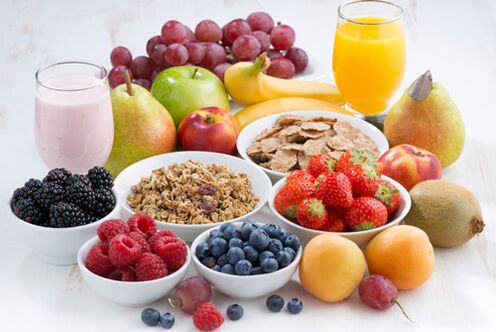
Proper nutrition for weight loss will bring much more benefit and joy if you gradually, consistently switch to it and do not go astray. But first you need to understand why our body so stubbornly resists any change, especially a decrease in sugar.
Sugar is truly the scourge of our time. Very few products offered to us in supermarkets are missing even a teaspoon of sugar. We're not even talking about desserts right now! Juices, yoghurts, pickles, sauces, semi-finished meat products, sausages and sausages, canned fish, instant soups, instant noodles. . . The list is almost endless! How terrible is the impending transition to new dietary principles - it turns out we have almost nothing to eat!? Do not panic, there is a way out and it is quite peaceful.
Proper nutrition for weight loss starts with three steps.
Step one:extract sugar in its pure form. Tea, coffee, unsweetened compotes. We reject preserves, jams, sweets, chocolates, cookies and other tea pleasures with friends or on a work break. Ice creams, cakes, even low-calorie marshmallows are excommunicated from our table! All carbonated drinks are prohibited. Try to go sugar-free for two weeks, just two weeks - you'll be amazed. It seems that the taste of tea is different. Coffee too. Cocoa with milk, but without sugar, recharges better than any stimulant. And what should be served with tea? At this stage, nuts (without salt), dried fruits, energy mixes with honey (nuts and dried fruit mixture passed through a meat grinder, you can add lemon), butter sandwiches (yes, yes! ), Cheese and regular sausage and homemade boiled pork, caviar, lightly salted salmon etc. At the same time, tea with all these goodies should be included in breakfast, lunch or dinner and should not be a habitual snack. However, about snacks a little later.
Second step:Once the body has switched from fast carbohydrates to slow carbohydrates, it's time to eliminate foods with a high glycemic index: premium wheat flour, white rice and potatoes. So all the buns, loaves, pies, porridge made from peeled rice, semolina porridge and everyone's favorite manna pie and all kinds of potatoes are automatically turned into a delicacy from everyday meals. Yes, and soups will be potato-free too. At the same time, rye bread and bakery products made from wholemeal flour (without sugar, remember? ), buckwheat steamed or soaked overnight in clean water, instant oatmeal, mixed very well with fermented milk products and all exotic products. or, spelled, forgotten grains such as quinoa. In addition, you need to exclude sweet fruits, such as bananas, grapes, pears, from the diet. Fruits are not included in this list due to their high acid content.
Step three:At this stage, you should give up any carbohydrates, leaving only natural carbohydrates that are part of vegetables and sour fruits. But sometimes the first two steps are enough to significantly reduce the weight. And if you fulfill several more conditions in parallel, you will not have to look for a new diet for yourself - you will move to a completely new level of life, where proper nutrition comes first.
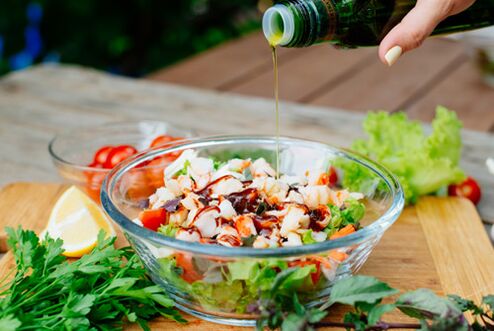
Proper nutrition for weight loss should be varied.This means that the balance should include not only the notorious BJU (proteins, fats and carbohydrates), but also vitamins and microelements. And if carbohydrates bring us energy in a pure, accessible form, then it is much more difficult for the body to get this energy from proteins or even fats. But, as is often the case, the hard to get is often the most beneficial. Calories from carbohydrates are often excessive, with our bodies taking almost no effort to process them, which is why "sugar calories" fit into comfortable fat rolls so quickly.
Proteins are vital for our body.Protein is important throughout life: in childhood it is a building material, in adulthood it is an element that helps our body work as long as possible and protect itself in the best way possible. Judge for yourself: the protein performs a protective function, helps to produce antibodies, transport, the most famous protein hemoglobin provides oxygen to each cell, the regulator - normal hormone production without protein is impossible, motor - is provided by all types of movement. proteins myosin and actin, plastic - collagen protein depends on the condition of the connective tissue, the appearance of the skin, etc. is responsible, energy - proteins provide the body with energy. But perhaps one of the most important tasks of a protein is the maintenance and transmission of gene information. The increasingly common dreaded disease "Alzheimer's disease" is believed to be directly related to inadequate protein intake (not only that, but the second most important component is somewhat inferior).
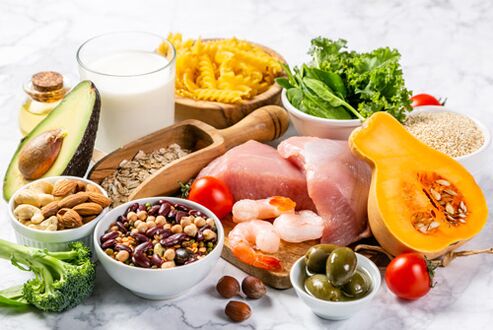
How much protein does the average adult need? Many nutritionists, doctors and supporters of proper nutrition adhere to the norms of protein intake, deduced more than a hundred years ago by the German scientist Max Rubner, and this norm was 0. 33 g of protein per 1 kg of human weight. Much has changed since then, science has progressed and recent research has yielded a rather high average rate of 1. 2 - 2. 0 g per 1 kg of weight. An impressive difference. Moreover, this 1. 2 - 2. 0 g is not the weight of the product, for example a piece of meat or a portion of beans, but the pure protein content in the product. A sample table of high protein foods is available on our website. Our site has written about the benefits of protein products more than once, but it never hurts to repeat these common truths.
Despite the huge popularity of vegan, raw food and vegetarian diets, we need at least 50% animal protein to keep the body healthy and not in a survival situation. These are eggs, dairy products, fish and seafood, meat and offal. Unlike plant foods, it is these proteins that have a complete set of amino acids. Although they should be eaten, just because variety is the essence of proper nutrition!
It is clear that there are very few products made of any substance on our planet. Almost every food is a combination of proteins, carbohydrates and fats. And here with the last ingredient - fats - perhaps the greatest crime story in the history of nutritional science took place. At one "perfect" moment, fats were declared the enemy of health. Everyone has heard horror stories about cholesterol, plaques in blood vessels and other fears. Looking at how the stores replenish their assortment with low-fat or completely low-fat products at enviable speed, you begin to doubt the sincere desire to feed us "correct", "healthy", "live" food, because there is nothing. correct and useful in the absence of fat in the diet.
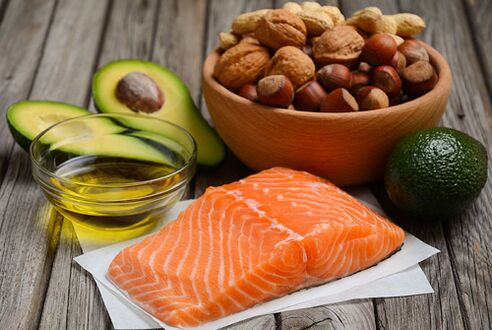
So what is the function of fats in our body? You will say - help the assimilation of fat-soluble vitamins. That's all? biology in school dayssomeone from his lectures will remember the heat exchange function of oils. In other words, the most important function of fats in the body is the sufractant metabolism, in other words, to provide oxygen exchange in the alveoli of the lungs. Fat covers the walls of the alveoli in the thinnest layer and allows us to breathe and live. My grandmother's methods of treating lung diseases immediately come to mind: badger fat, dog fat, goose fat, hot milk and butter - fat is everywhere, inside and out, and it helped! And by the way, it still helps, only drugs for the treatment of hypoxia (oxygen starvation) that are currently sold for wild money, are actually an oil emulsion. Another important function of fats is the synthesis of membranes. The cell membrane consists of 70-85% fats, and the function of the membrane is to provide protection, thermal insulation and selective permeability of the cells (since everything that tries to enter the cell is useful and not necessary for it). The myelin layer, this insulating sheath of our nerves, is 70-80% saturated fat. No myelin - get Alzheimer's disease, senile (almost younger) sclerosis and dementia. Fat is one of the most important substances that ensures the work of the membranes, myelin sheath, as well as the functioning of the central and peripheral nervous system. Keep this in mind when choosing between 0. 5% and 3. 2% fat milk.
Another important function of fats is hormonal. Fats are the source for the synthesis of hormones and many of them are found in our body. These are growth hormones, protein hormones, thyroid hormones, digestive system hormones, steroid hormones, adrenal hormones, sex hormones, etc. It is clear that the slightest prejudice, insufficient production of any hormone threatens with great disruptions in the work of the whole organism. A sudden attack of blackheads and acne, any skin rash is a sign of low androgen levels. Frequent headaches "for no reason" can be a sign of low estrogen levels. Constant insomnia - not enough progesterone. Fatigue, exhaustion, and even exhaustion at rest can be a sign of a violation of the production of thyroid hormones. Hair loss is also a sign of this disorder. Weight gain may be due to high levels of the hormones estrogen, cortisol, and insulin, along with low testosterone levels. Forgetfulness and distraction are indicators of low estrogen and cortisol levels. How everything is connected!
Fats are responsible for heat regulation. That's why non-diet men are often sexier than women who lose weight consistently. Constant freezing of the hands and feet is most likely a sign of a lack of fat, if not an innate feature. The most famous function of fats is to help with the absorption of fat-soluble vitamins: A, E, D, K. Sitting on a low-fat diet and drinking vitamin complexes - not an option, vitamins will not be absorbed.
And last but not least - vitamins, minerals, macro and microelements. These substances are found in all products in different amounts and combinations, but special attention should be paid to fresh vegetables, roots, berries and fruits. Vitamin C, one of the most valuable vitamins, is not synthesized in our body and we can only get it from fresh herbal products. Our site has filled a whole section about vitamins, read it, it's helpful! Plant foods contain enzymes and flavonoids, all kinds of minerals, without which we cannot function normally. For example, potassium - without it, the work of the heart will be impaired. Magnesium is responsible for the health of the brain, nervous and hormonal systems and is involved in metabolic processes. Also in vegetable products there is fiber - without it the processes of digestion and peristalsis are almost impossible!
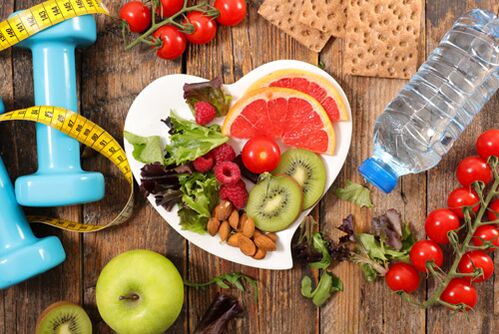
Proper nutrition for losing weight and healing the body includes the following principles:
Do not eat more than three times a day. Unexpected, right? But what about the 5-6 meals a day advertised in many recommendations? Such fractional dishes are perfect for children, athletes and seriously ill citizens. If you're not in any of these categories, eat three or even twice a day.
Eat only when you are hungry, not at night. Breakfast is optional! If you don't want to eat in the morning, reschedule breakfast after a few hours. Don't push yourself for food just because someone said breakfast is the most important thing.
Learn to listen to yourself and understand the difference between hunger and the habit of mixing things up. The advice below will help with this.
Drink water. Not in liters as is sometimes recommended. Not boiled. Ideally bottled or spring loaded. It's easy to shame the drinking regimen: 2 glasses of warm (cold and not boiling water) in the morning, 1-2 glasses during the day and 1 glass in the evening. Sometimes it is enough just to drink water to realize that there is thirst, not hunger.
Get in the habit of buying all kinds of nuts and seeds more often. In addition to oils, they contain a large amount of macro and microelements.
Eat all the food. So it's not fat free! Cottage cheese - 9% fat, no less, sour cream, cream coffee, butter sandwiches, fatty cheeses, fatty sea fish, exotic avocado, bacon! This is not a typical "fire to fire" distortion. Of course, everything needs a measure.
Don't forget the proteins! But with what to combine it is no less important. And this advice will be the last.
Eat vegetables. Lots of vegetables and herbs. Fresh, pickled, pickled, steamed, boiled and even deep-fried! But fresh salads are of course preferred. Calculating the amount of vegetables is not difficult: mentally divide your plate into two parts - half will be occupied by vegetables, and the second will fit proteins, fats and the minimum allowable carbohydrates.
Proper nutrition for weight loss is not strict tables and recipes. This is a conscious approach. All these tips will only work if you are almost completely free from carbohydrates. Combine protein with carbohydrates (mashed potatoes and cutlets) or fats with carbohydrates (breaded bacon) in one dish and you're done. Or rather no, of course you won't die right away. For every new kilogram you will continue to live, sighing and complaining about injustice ("I'm literally sitting in the same water, where does the fat come from??? "). You do not need to sit on the water, you do not need to starve, torment yourself with diet products. Start with just three steps and walk to health and beauty without turning anywhere.















































































